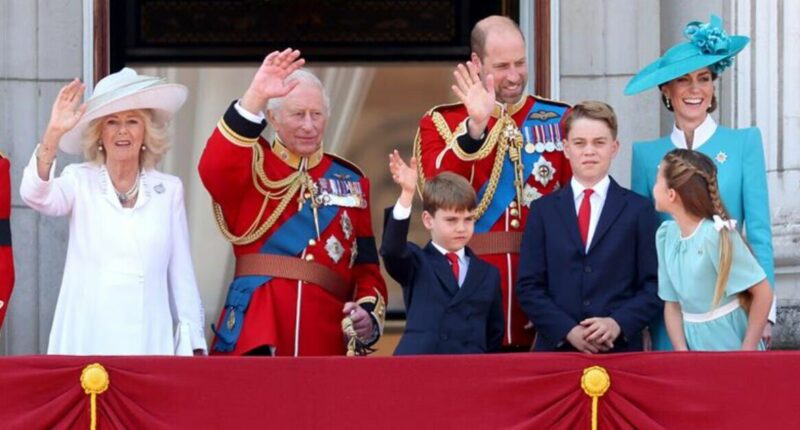Share this @internewscast.com
Plenty of us are intrigued to know more about our heritage, family history and who we may or may not be related to. There’s no longer the need to painstakingly sift through heritage records and census material, however, as there are many quick and easy ways to find these things out from online platforms that anyone can navigate.
Now, the platform MyHeritage is offering a 14 day free trial that offers people the opportunity to document their family tree, find new relatives and explore billions of historical records. They have even given a list of 35 surnames that may lead people to finding out they are related to royalty.
According to the brand, certain surnames have long been associated with nobility and may strongly indicate a link to royal lineage, and if users have one of the following 35 surnames, they may have a surprise in store in terms of relatives.
The 35 surnames are:
1. Windsor: The current British royal family’s surname since 1917.
2. Tudor: The Welsh dynasty that produced monarchs like Henry VIII and Elizabeth I.
3. Stuart: A Scottish house that ruled England and Scotland in the 16th and 17th centuries.
4. Plantagenet: A royal house that provided England with monarchs from Henry II to Richard III.
5. Capet: The dynasty that ruled France from 987 to 1328.
6. Bourbon: A European royal house that ruled France, Spain, and other territories.
7. Habsburg: A prominent royal house of Europe, known for ruling the Holy Roman Empire.
8. Hanover: The British royal house from George I to Queen Victoria.
9. Valois: A cadet branch of the Capetian dynasty that ruled France.
10. Lancaster: A branch of the Plantagenet dynasty, known for its role in the Wars of the Roses.
11. York: Another Plantagenet branch, also central to the Wars of the Roses.
12. Bruce: A Scottish royal house, with Robert the Bruce being a notable king.
13. de Valois: A French royal house that produced several kings.
14. de Medici: An influential Italian family that produced royalty and popes.
15. Savoy: A royal family that once ruled parts of Italy and France.
16. Orange-Nassau: The Dutch royal family.
17. Oldenburg: A European royal house that includes the current Danish royal family.
18. Glucksburg: A branch of the House of Oldenburg, associated with Danish and Norwegian royalty.
19. Romanov: The last imperial dynasty to rule Russia.
20. Baskerville: A noble family name with historical ties to English aristocracy.
21. Darcy: A surname associated with medieval nobility and landowners in England and Ireland.
22. Neville: A powerful English noble family with significant influence during the medieval period.
23. Percy: An aristocratic English family known for their role in British history.
24. Astley: A noble surname linked to the English peerage.
25. Capell: A distinguished English family with historical ties to the aristocracy.
26. Howard: A prominent aristocratic family in the UK, holding the title of Dukes of Norfolk.
27. Seymour: The family of Jane Seymour, third wife of Henry VIII, with ties to the Dukedom of Somerset.
28. Grey: Associated with Lady Jane Grey, England’s nine-day queen.
29. FitzAlan: A powerful medieval family, former Earls of Arundel.
30. Courtenay: A noble family with connections to English and French royalty.
31. Manners: The surname of the Dukes of Rutland, a high-ranking noble family.
32. Russell: Connected to the Dukes of Bedford, an influential aristocratic lineage.
33. Cavendish: The surname of the Dukes of Devonshire, a powerful British noble family.
34. Talbot: A noble family holding the Earldom of Shrewsbury.
35. Spencer: The family name of Princess Diana, tying it to the modern British royal family.
Although these surnames don’t mean that people will definitely be related to the royals, it is a great starting point for those who are curious. To find out, people simply have to go to MyHeritage and begin to build their family tree with the website’s feature that allows users to add names, dates, photos and stories to share with other potential members and then have a search through the historical records which have census records data, birth and death certificaties and marriage records.
The website also has DNA tests available. They will give customers information about their ethnic background and will match them with relatives.
If this platform isn’t quite what family historians are after, there are other DNA sites to choose from – such as Ancestry, which offers DNA tests from £79 and organises and connects shoppers with their relatives and also gives insights about family origins. Another is 23andMe which offers DNA testing with an ancestry breakdown, personalised health insights and more for prices beginning at £89.
MyHeritage has a high 4 out of 5 star rating on Trustpilot, however. One person said: “Immediate accurate statistics of my immediate family members.”
Another wrote: “Regular updates of discoveries, positive results. This site is not just about the money, it is about genuine results for the family history researcher.”
“My family history has expanded and the format is easily understood. Changes are quick and easy. Thank you,” said another shopper.
Not everyone agreed, however, as one user said: “I don’t fully understand it. I can’t find a user guide, difficult to navigate, Help Center does not always understand my problems. My previous version was much easier for me,” said another.
However, another amateur sleuth described using the site as an ‘enjoyable experience,’ adding: “Finding related families and information relating to individuals has been a wonderful experience. My Heritage has made it even easier to trace ancestors and verify relations.”
The DNA tests and platform is available at the MyHeritage website.















